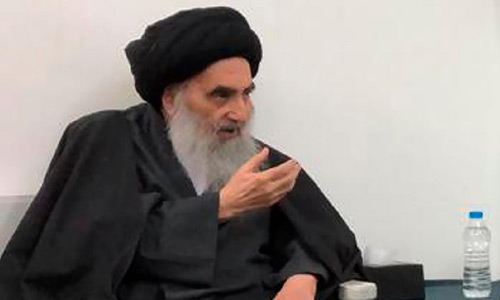BAGHDAD - Iraq’s top Shi’ite Muslim cleric on Friday condemned the U.S.-Iranian military confrontation taking place on Iraqi soil, saying it risked plunging the war-ravaged country and the wider Middle East into deeper conflict.
Grand Ayatollah Ali al-Sistani said attacks by both sides inside Iraq this month showed blatant disregard for Iraqi sovereignty and its people stood to suffer the most from Washington and Tehran’s conflict.
Also on Friday, European foreign ministers gathered in Brussels to find ways to ease the precarious situation that has unfolded in the past week.
In Washington, the U.S. House of Representatives voted on Thursday to stop President Donald Trump from further military action against Iran.
But the region remained tense as Iranian military commanders threatened more attacks, fuelling worries that the apparent pause in hostilities could be short-lived.
The latest flare-up in the shadow war between the two foes started with the U.S. killing of Iran’s top military commander, General Qassem Soleimani, in an air strike next to Baghdad airport on Jan. 3.
Iran responded on Wednesday by firing missiles at U.S.-led forces in Iraq. In the aftermath, both sides backed down from intensifying the conflict.
But neighboring Iraq looks set to bear the brunt of further violence as the main arena for the U.S.-Iranian military confrontation, its leaders caught in a bind as Washington and Tehran are also the Baghdad government’s main allies and vie for influence there.
In a message delivered through a representative speaking at Friday prayers in the holy city of Kerbala, Ayatollah Sistani said the series of attacks were a violation of sovereignty and that no foreign powers should be allowed to decide Iraq’s fate.
“The use of over-the-top methods by different sides which possess power and influence...will only entrench the crisis and prevent a solution,” he said.
“The latest dangerous aggressive acts, which are repeated violations of Iraqi sovereignty, are a part of the deteriorating situation” in the region, he said.
Sistani, who wields huge influence over public opinion in Iraq, only weighs in on politics during times of crisis. He is seen as a voice of moderation and has urged warring sides in the Middle East and inside Iraq to seek a peaceful way out of the current crisis.
“The (Iraqi) people have suffered enough from wars...Iraq must govern itself and there must be no role for outsiders in its decision-making,” Sistani said.
Iraq is struggling to recover from decades of war, sanctions and sectarian conflict including two U.S.-led invasions and the rise and violent military defeat of extremist Sunni militant groups al Qaeda and Islamic State. (Reuters)
Home » World » Iraqi Cleric Condemns U.S. And Iran as Fears of Wider Conflict Persist
Iraqi Cleric Condemns U.S. And Iran as Fears of Wider Conflict Persist

